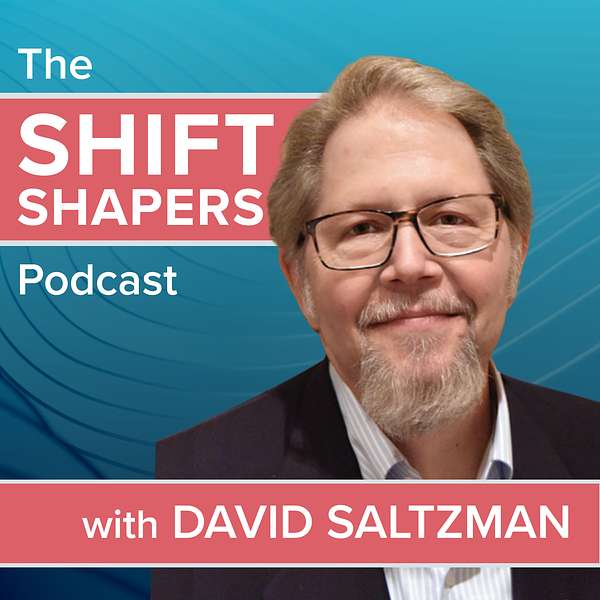
The ShiftShapers Podcast
Change either paralyzes or energizes - the choice is yours. Hear from businesses and entrepreneurs who have become energized and who have profited by shaping the shifts in their markets and practices. Become a SHIFTSHAPERS INSIDER and get our latest download, advance notice of all podcasts, podcast summaries, and special INSIDER-ONLY content. INSIDER SIGN UP
The ShiftShapers Podcast
Ep #489 Navigating Legislative and Regulatory Challenges with David Mordo (Part 2) | ShiftShapers
This episode of the ShiftShapers Podcast features a discussion with David Mordo, Senior Compliance Officer at MZQ Consulting, focusing on essential legislative and regulatory knowledge advisors need to possess, especially pertaining to offering health benefit packages. The conversation highlights the recent FTC ruling on non-compete clauses, emphasizing its potential impact on employers and the broader implications for your workplace. Mordo and our host David Saltzman also delve into a pressing lawsuit against Johnson & Johnson related to fiduciary duties and prescription drug pricing, forecasting a rise in similar legal challenges. Furthermore, the interview underscores the importance of advisors understanding their role in ensuring employer clients comply with fiduciary responsibilities, especially in relation to employee health plans and benefits to meet complex compliance regulations.
Key Takeaways from the episode of the ShiftShapers Podcast:
- The Federal Trade Commission banned non-compete clauses, aiming to boost employee wages and opportunities.
- Lawsuits over fiduciary responsibilities in benefit plans are increasing, underscoring the importance of acting in employees' best interests.
- Advisors are pivotal in educating employers on fiduciary duties and compliance to navigate benefit complexities.
- Compliance professionals help translate regulations for brokers and employers to ensure adherence to regulations and to avoid risks.
- Fiduciary care under ERISA is crucial for all employers to comply with regulations and protect employees.
https://www.mzqconsulting.com/
One of the things that I think advisors need to understand and I'm not sure everyone does just yet is that the fiduciary responsibility cannot be transferred to a PBM or a TPA or to an advisor. It's the plan's responsibility. How do you tell advisors that they should deliver that message? What's the best way for them to do that to their employer clients?
Speaker 2:Swiftly, directly and firmly. It is our responsibility to our clients as employers I mean, that's a little bit of a fiduciary responsibility that we have as industry professionals to sit down and explain to your employer client, whether that employer has three employees or 30,000 employees. You have to always act in the best interest of your client. You may think you're doing so, and many are. Look, many are doing the right thing. They have been advised properly, they know that they are caring employers.
Speaker 2:But there are others who just think of it as something way out there that is not to be concerned with. They're making assumptions that they're doing the right thing and it is up to the broker to constantly remind their client. Here is what your responsibilities are, and while I appreciate the fact that you think you're acting in the best interest by negotiating one price with a PBM, take a look at it again, because we can get this drug for a whole lot less or we can make sure that the network that you're dealing with has more providers. So I think we bear a big responsibility, because the employer's lawyer or the accountant or the financial advisor is unlikely to be the one to advise them. It's going to be us, it's going to be the broker advisor, consultant that is in the know, and it has to be. It has to be done in a very firm way to let them know that fiduciary duties under ERISA are not to be taken for granted.
Speaker 1:Okay, and yet if an advisor gets too far into the weeds, they risk liability. And I remember something that you said last week when we were talking about RxDC, which is that one of the things advisors might consider doing is finding a specialist firm that can help advise about what a committee should look like for a plan, what the charter should look like, how often meetings should occur, record keeping, all of those things that, as you rightly point out, a lot of businesses either don't know about or don't think about day to day. Would that be the same advice on this question In?
Speaker 2:part, yeah. So, for instance, there's a whole new mini or subset industry of, for instance, pharmacy consultants who are there to look at, decipher and make recommendations on your prescription portion of your contract. They look at it, they take it apart, they have an idea of the cost of the meds. They get all the data. So, yes, that is a specific specialty that an employer can hire a pharmacy consultant. An employer can hire an employment law firm if you will. Obviously not everybody can do that, but there are plenty of consultants out there with a specialty in various aspects of the employer's health plan. Look, there are TPAs that are very talented. They have very talented people. They deal with employer groups all the time. They decipher the contracts, they're well-versed in ERISA and they're there to help. But all of that, I think, is quarterbacked by the broker. Employer is not going to go searching and vetting a pharmacy consultant, the broker will. So we're the quarterbacks.
Speaker 1:Well, and that leads us to the last question, I think, for today's interview, which is let's pull back a little bit and talk about the broader canvas, about compliance in the entire world of employee benefits. What does that look like from an advisor's perspective? What should it look like? What should they be doing and maybe what shouldn't they be doing? Yeah, so,